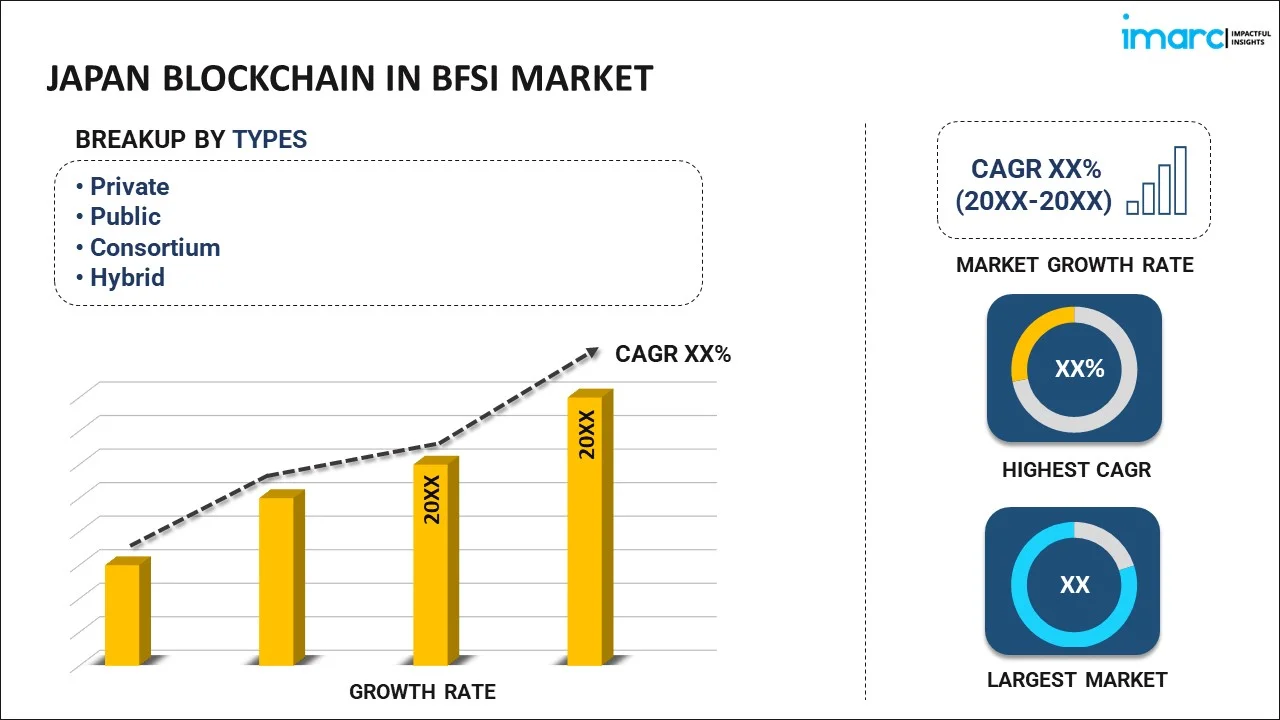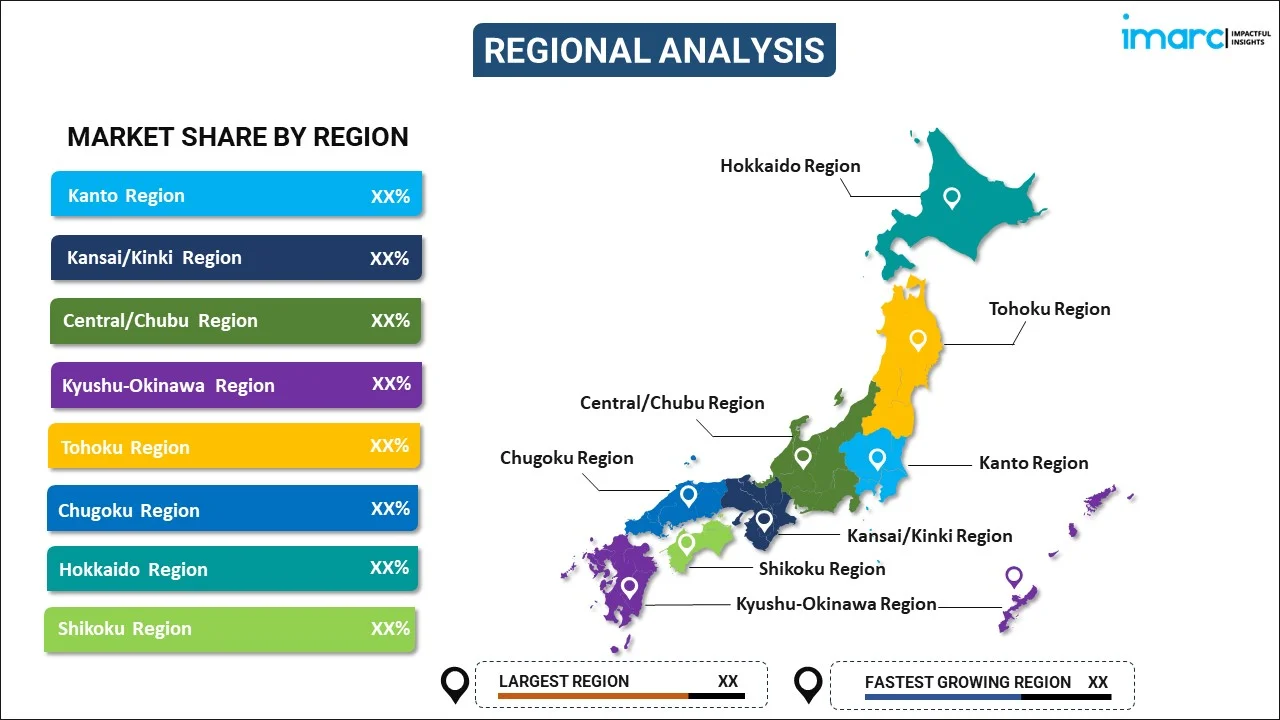
Japan Blockchain in BFSI Market Report by Type (Private, Public, Consortium, Hybrid), Component (Platform, Services), Application (Digital Currency, Record Keeping, Payments and Settlement, Smart Contracts, Compliance Management, and Others), End User (Banking, Insurance, Non-Banking Financial Companies (NBFCs), and Region 2026-2034
Market Overview:
Japan blockchain in BFSI market size reached USD 162.7 Million in 2025. Looking forward, IMARC Group expects the market to reach USD 1,660.7 Million by 2034, exhibiting a growth rate (CAGR) of 29.45% during 2026-2034. The increasing application of blockchain that facilitates the tokenization of various assets, making it easier to trade and transfer ownership of assets such as real estate, securities, and commodities, is driving the market.
|
Report Attribute
|
Key Statistics
|
|---|---|
|
Base Year
|
2025
|
|
Forecast Years
|
2026-2034
|
|
Historical Years
|
2020-2025
|
|
Market Size in 2025
|
USD 162.7 Million |
|
Market Forecast in 2034
|
USD 1,660.7 Million |
| Market Growth Rate 2026-2034 | 29.45% |
Access the full market insights report Request Sample
Blockchain in BFSI (banking, financial services, and insurance) refers to a decentralized and distributed ledger technology that securely records and verifies transactions across a network of computers. This technology enhances transparency, reduces fraud, and increases operational efficiency in the financial sector. In BFSI, blockchain is primarily employed for secure and tamper-proof record-keeping of financial transactions, including payments, loans, and asset transfers. Smart contracts, self-executing contracts with the terms of the agreement directly written into code, streamline processes and automate tasks, reducing the need for intermediaries. Blockchain's decentralized nature minimizes the risk of a single point of failure, enhances data integrity, and fosters trust among participants. The technology holds promise for improving financial inclusion, streamlining regulatory compliance, and creating more resilient and efficient financial systems by revolutionizing the way data is stored, verified, and shared within the BFSI ecosystem.
Japan Blockchain in BFSI Market Trends:
The blockchain in BFSI market in Japan is driven by a confluence of factors. Firstly, its inherent decentralization enhances security and transparency, mitigating the risks associated with traditional centralized systems. This decentralization, coupled with cryptographic encryption, ensures the integrity of financial transactions, fostering trust among stakeholders. Moreover, the immutability of blockchain records serves as a potent driver in the BFSI market. Once a block is added to the chain, it cannot be altered, providing an unforgeable record of transactions. This feature significantly reduces fraud, a pervasive challenge in the financial industry. The traceability of transactions through the entire blockchain network further augments accountability, helping regulatory compliance and auditability. In addition to this, the drive for operational efficiency propels blockchain adoption in BFSI. Smart contracts, self-executing codes with predefined rules automate processes, cutting down on time and resource expenditures. This efficiency gain is particularly crucial in the BFSI sector, where rapid and accurate transaction processing is paramount. Overall, the interplay of decentralization, immutability, traceability, and operational efficiency positions blockchain is expected to drive the market in Japan in the coming years.
Japan Blockchain in BFSI Market Segmentation:
IMARC Group provides an analysis of the key trends in each segment of the market, along with forecasts at the country level for 2026-2034. Our report has categorized the market based on type, component, application, and end user.
Type Insights:

To get detailed segment analysis of this market Request Sample
- Private
- Public
- Consortium
- Hybrid
The report has provided a detailed breakup and analysis of the market based on the type. This includes private, public, consortium, and hybrid.
Component Insights:
- Platform
- Services
A detailed breakup and analysis of the market based on the component have also been provided in the report. This includes platform and services.
Application Insights:
- Digital Currency
- Record Keeping
- Payments and Settlement
- Smart Contracts
- Compliance Management
- Others
The report has provided a detailed breakup and analysis of the market based on the application. This includes digital currency, record keeping, payments and settlement, smart contracts, compliance management, and others.
End User Insights:
- Banking
- Insurance
- Non-Banking Financial Companies (NBFCs)
A detailed breakup and analysis of the market based on the end user have also been provided in the report. This includes banking, insurance, and non-banking financial companies (NBFCs).
Regional Insights:

To get detailed regional analysis of this market Request Sample
- Kanto Region
- Kansai/Kinki Region
- Central/ Chubu Region
- Kyushu-Okinawa Region
- Tohoku Region
- Chugoku Region
- Hokkaido Region
- Shikoku Region
The report has also provided a comprehensive analysis of all the major regional markets, which include Kanto Region, Kansai/Kinki Region, Central/ Chubu Region, Kyushu-Okinawa Region, Tohoku Region, Chugoku Region, Hokkaido Region, and Shikoku Region.
Competitive Landscape:
The market research report has also provided a comprehensive analysis of the competitive landscape. Competitive analysis such as market structure, key player positioning, top winning strategies, competitive dashboard, and company evaluation quadrant has been covered in the report. Also, detailed profiles of all major companies have been provided.
Japan Blockchain in BFSI Market Report Coverage:
| Report Features | Details |
|---|---|
| Base Year of the Analysis | 2025 |
| Historical Period | 2020-2025 |
| Forecast Period | 2026-2034 |
| Units | Million USD |
| Scope of the Report | Exploration of Historical and Forecast Trends, Industry Catalysts and Challenges, Segment-Wise Historical and Predictive Market Assessment:
|
| Types Covered | Private, Public, Consortium, Hybrid |
| Components Covered | Platform, Services |
| Applications Covered | Digital Currency, Record Keeping, Payments and Settlement, Smart Contracts, Compliance Management, Others |
| End Users Covered | Banking, Insurance, Non-Banking Financial Companies (NBFCs) |
| Regions Covered | Kanto Region, Kansai/Kinki Region, Central/ Chubu Region, Kyushu-Okinawa Region, Tohoku Region, Chugoku Region, Hokkaido Region, Shikoku Region |
| Customization Scope | 10% Free Customization |
| Post-Sale Analyst Support | 10-12 Weeks |
| Delivery Format | PDF and Excel through Email (We can also provide the editable version of the report in PPT/Word format on special request) |
Key Questions Answered in This Report:
- How has the Japan blockchain in BFSI market performed so far and how will it perform in the coming years?
- What has been the impact of COVID-19 on the Japan blockchain in BFSI market?
- What is the breakup of the Japan blockchain in BFSI market on the basis of type?
- What is the breakup of the Japan blockchain in BFSI market on the basis of component?
- What is the breakup of the Japan blockchain in BFSI market on the basis of application?
- What is the breakup of the Japan blockchain in BFSI market on the basis of end user?
- What are the various stages in the value chain of the Japan blockchain in BFSI market?
- What are the key driving factors and challenges in the Japan blockchain in BFSI?
- What is the structure of the Japan blockchain in BFSI market and who are the key players?
- What is the degree of competition in the Japan blockchain in BFSI market?
Key Benefits for Stakeholders:
- IMARC’s industry report offers a comprehensive quantitative analysis of various market segments, historical and current market trends, market forecasts, and dynamics of the Japan blockchain in BFSI market from 2020-2034.
- The research report provides the latest information on the market drivers, challenges, and opportunities in the Japan blockchain in BFSI market.
- Porter's five forces analysis assist stakeholders in assessing the impact of new entrants, competitive rivalry, supplier power, buyer power, and the threat of substitution. It helps stakeholders to analyze the level of competition within the Japan blockchain in BFSI industry and its attractiveness.
- Competitive landscape allows stakeholders to understand their competitive environment and provides an insight into the current positions of key players in the market.
Need more help?
- Speak to our experienced analysts for insights on the current market scenarios.
- Include additional segments and countries to customize the report as per your requirement.
- Gain an unparalleled competitive advantage in your domain by understanding how to utilize the report and positively impacting your operations and revenue.
- For further assistance, please connect with our analysts.
 Request Customization
Request Customization
 Speak to an Analyst
Speak to an Analyst
 Request Brochure
Request Brochure
 Inquire Before Buying
Inquire Before Buying




.webp)




.webp)












